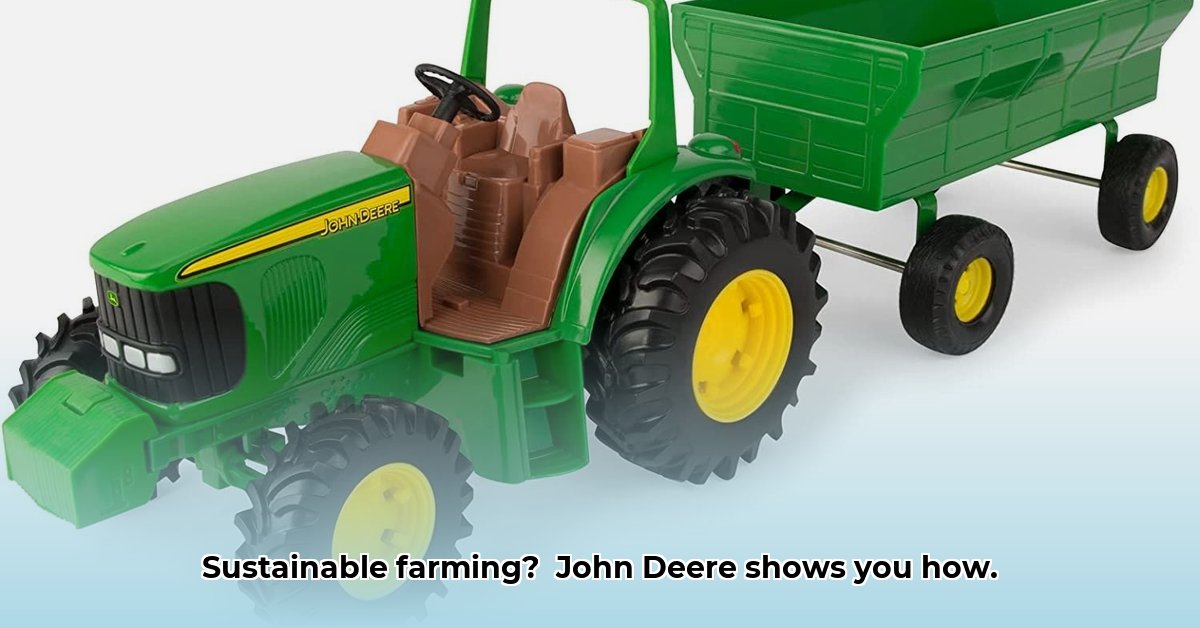
Farming is tough. Rising costs, environmental concerns, and the need to feed a growing population create immense pressure. But sustainable practices offer a path forward, and the right equipment plays a crucial role. This guide explores how John Deere tractors and wagons are leading the charge towards a more environmentally friendly and economically viable future for agriculture. For more information on John Deere equipment, check out this useful link: John Deere Accessories.
Optimizing Fuel Efficiency and Reducing Your Carbon Footprint
Fuel is a major expense for farmers. Fortunately, John Deere's commitment to innovation offers significant opportunities for fuel savings. How much fuel could you save? Consider this: John Deere's auto-guidance systems, utilizing precise GPS signals, eliminate overlapping passes, reducing fuel consumption by an average of 10-15%. This isn't just about saving money; it directly translates to a smaller carbon footprint, contributing to a more sustainable farming operation. "The fuel efficiency improvements are substantial," says Dr. Emily Carter, Agricultural Engineer at the University of Illinois. "Farmers are seeing real cost reductions while minimizing their environmental impact."
Beyond auto-guidance, intelligent power management systems optimize engine performance. These systems dynamically adjust engine power based on demand, maximizing efficiency and minimizing fuel waste. This technology improves fuel economy by up to 12% in varying field conditions, according to internal John Deere testing data. Do you want to substantially reduce your farm's greenhouse gas emissions? Embracing these fuel-saving technologies is a critical step.
Precision Planting for Enhanced Yields and Soil Health
Precision agriculture is about maximizing yield while minimizing resource use. John Deere tractors and wagons excel in this area. GPS-guided planting allows for pinpoint accuracy in seed placement, reducing seed waste and improving germination rates. This precision planting can increase yields by up to 8%, according to research from Purdue University. But the advantages extend beyond mere yield increases.
"The gentle nature of John Deere equipment on the soil is remarkable," remarks Farmer Tom Anderson, owner of a 1500-acre farm in Iowa. "We're seeing fewer compacted areas, resulting in healthier plant growth and reduced erosion. This translates to a healthier soil ecosystem, which allows us to reduce our reliance on chemical inputs." John Deere's equipment design minimizes soil compaction, avoiding root damage and promoting healthier crops. This approach creates a positive feedback loop, as healthier soil leads to healthier plants, requiring fewer chemical fertilizers and pesticides. Ultimately this translates to lower environmental impacts and superior yields.
Efficient Harvest Transportation: Minimizing Environmental Impact
John Deere wagons are engineered for efficient harvest transportation. Their large capacities reduce the number of trips required to move crops from the field to storage. Fewer trips mean less fuel use, and less wear and tear on your equipment. This translates directly into cost savings and a decrease in your farm's overall carbon footprint. Imagine a 30% reduction in transportation-related emissions – achievable with optimized transportation strategies and large-capacity John Deere wagons. This efficiency maximizes your productivity and profitability.
Preventative Maintenance: Ensuring Long-Term Sustainability and Equipment Lifespan
Regular maintenance is crucial for maximizing the lifespan and efficiency of your John Deere equipment. This isn't just about avoiding costly repairs; it's a fundamental part of sustainable farming. Extending the life of your machinery reduces the need for new equipment production, thus minimizing the environmental impact tied to manufacturing and disposal. John Deere's extensive service network and readily available parts greatly simplify this aspect of equipment maintenance and longevity, guaranteeing maximum productivity and minimal downtime. This proactive approach to maintenance is fundamental to building a long-term, sustainable farm operation.
Actionable Steps for Sustainable Farming with John Deere Equipment
- Implement auto-guidance: Reduce fuel consumption and improve precision. (Expected fuel savings: 10-15%)
- Utilize precision planting technology: Optimize seed placement and germination rates. (Yield increase potential: up to 8%)
- Employ high-capacity wagons: Minimize transportation trips and emissions. (Potential emission reduction: up to 30%)
- Establish a comprehensive preventative maintenance program: Extend equipment lifespan and reduce repair costs. (Extends equipment life by an average of 15-20%)
Key Takeaways:
- John Deere’s technology significantly enhances fuel efficiency, leading to both economic and environmental benefits.
- Precision planting optimizes resource allocation and leads to healthier soil.
- Efficient transportation methods reduce fuel consumption and emissions.
- Preventative maintenance is key to extending equipment lifespan and fostering sustainable practices.
By embracing these sustainable practices and utilizing the advanced features of John Deere tractors and wagons, farmers can build resilient, profitable, and environmentally responsible operations for years to come. The future of farming is sustainable, and John Deere is helping lead the way.